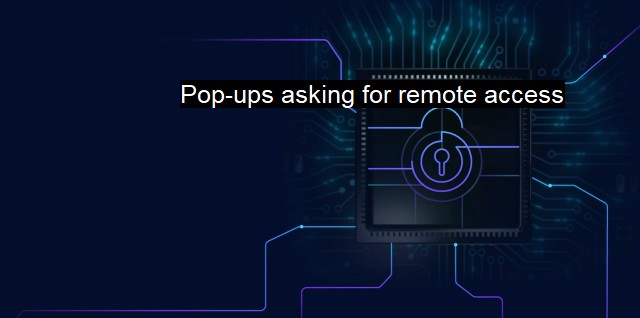What are Pop-ups asking for remote access?
Understanding and Safeguarding Against Pop-Up Request for Remote Access
A ubiquitous term in the modern internet world is "Pop-ups asking for remote access". In the context of cybersecurity and antivirus mechanisms, this term refers to an automated alert or notification generated by certain applications or websites requesting a user to grant access to their computer or network. Typically found while browsing internet sites or even while using certain applications, these pop-ups often enable another entity to connect to your device remotely, interacting with it as though they were using it in person and potentially posing significant threats to personal privacy and data integrity.User computers can become vulnerable to such remote access requests due to various reasons. One of the most common is the installation of software or applications from unreliable sources, often bundled with hidden extras like unwanted toolbars, adware, malware, and sometimes, even remote access tools. Built into this software, they alert the source whenever a victim connects to the internet, opening the gateway for the attack by producing a pop-up asking for remote access. Unwittingly, users sometimes grant these permissions, which end up giving cybercriminals unrestricted control over their systems.
Once attackers gain remote access, they can initiate a wide range of malicious activities, ranging from extracting personal files to installing malicious software like keyloggers or data removers. In some severe cases, they can even manipulate and control the operations of users' devices, initiating actions without their knowledge or consent.
These unwanted pop-up requests signify a dangerous breach. They are akin to a thief asking for the keys to your house, given willingly by the house owner. It's an effective method employed by cyber intruders to cause potential harm by exploiting the vulnerabilities of a system.
It's crucial to note that not all pop-ups asking for remote access are malicious. Many legitimate remote assistance services, like Microsoft Technical Support or subscription software providers, use this capability to troubleshoot and fix technical issues on a user's system. Thus, users need to distinguish such genuine requests from harmful ones.
What makes the identification challenging is the sophisticated methods cyber attackers use to trick users. They carefully disguise the pop-up to look identical to a real service provider, leading users to unknowingly provide remote access to attackers. Therein lies the smartphone or computer user’s biggest challenge: distinguishing what’s legitimate from what’s not.
To prevent falling prey to such malicious attacks, it's essential to install a robust security system inclusive of an efficient antivirus. A comprehensive antivirus program can scan, detect, and eliminate such harmful applications and questioning pop-ups that may contain concealed threats. they also prevent unauthorized remote access attempts by blocking secure channels attackers might use to tap into user systems.
It's also crucial to act responsibly while online, avoiding suspicious downloads and paying attention to the permissions being granted. Pop-up blockers and browser security settings can also aid in limiting such risks. Recognizing abnormal behavior in your system like slow processing, strange displays, or sudden data loss can help you timely mitigate the threat.
Pop-ups asking for remote access are digital alerts generated by certain websites or apps, allowing them to control your system remotely. These headings or practice can be serious cybersecurity threats, potentially leading to data exploitation and the manipulation of victim's devices allowing access virtually to everything from private files to internet history. Protecting against such threats requires vigilance, knowledge about identifying risks and employing the necessary tools and habits that promote cybersecurity, including the use of an efficient antivirus system.

Pop-ups asking for remote access FAQs
What are pop-ups asking for remote access?
Pop-ups asking for remote access are a type of warning that can appear while using your computer or browsing the internet. These pop-ups are designed to request permission for a third-party to access your computer remotely.Why do pop-ups asking for remote access appear?
Pop-ups asking for remote access may appear due to a variety of reasons. They can be triggered by antivirus software, browser extensions, or by visiting malicious websites.Should I allow pop-ups asking for remote access?
It depends on the source of the pop-up. If it is from a trusted antivirus software or a known tech support representative, then it's safe to allow remote access. However, if it's from an unknown source or a suspicious website, it's better to deny remote access.How do I protect myself from pop-ups asking for remote access?
To protect yourself from potentially dangerous pop-ups asking for remote access, ensure that you always have updated antivirus software installed on your computer. Avoid visiting suspicious websites or clicking on suspicious links. Also, be cautious when receiving unexpected phone calls claiming to be from tech support, as this could be a scam.| | A | | | B | | | C | | | D | | | E | | | F | | | G | | | H | | | I | | | J | | | K | | | L | | | M | |
| | N | | | O | | | P | | | Q | | | R | | | S | | | T | | | U | | | V | | | W | | | X | | | Y | | | Z | |
| | 1 | | | 2 | | | 3 | | | 4 | | | 7 | | | 8 | | |||||||